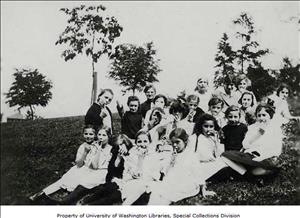The National Council of Jewish Women, Seattle section, founded in 1900, is a volunteer organization inspired by Jewish values that works to improve the quality of life for women, children, and families. The Seattle section's most significant undertaking of the first half of the century, was the establishment of Settlement House, through which hundreds of new immigrants received medical and employment assistance, legal services, social orientation, and education. The organization has also advocated for reproductive choice, for fair treatment for Japanese Americans and Soviet Jews, and for childcare.
The Seattle section of the National Council of Jewish Women (NCJW), was established seven years after the national organization was founded in Chicago.
The preliminary gathering took place at the home of Mrs. Sigismund Aronson where “plans were perfected for the calling together of all the Jewish women in the city of Seattle” (Goldsby).
On November 19, 1900, 34 women gathered at Morris Hall, at 9th Avenue and Yesler Way, and drew up a petition to open a Seattle section of the NCJW. The following departments were delineated: Religion, Sabbath School, Membership, Social, and Philanthropic. On December 13, 1900, Merle (Dollie) Degginger presided over the first official meeting.
Early activities of the Seattle section NCJW included “visiting the hospitals to bring cheer to Jewish patients,” (the Fruit and Flower committee), looking after neglected graves, and establishing a sewing school in the vestry rooms of Temple de Hirsch.
The Seattle section's most significant undertaking of the first half of the century was to establish Settlement House (now Neighborhood House). The “Settlement House” was part of a movement to address social problems resulting from crowded cities, industrialization, and immigration.
Settlement House opened in 1906 when the SCJW Committee on Philanthropy rented the lower part of a home on 12th Avenue and Washington Street. An early program created a sewing school for 30 girls. The committee petitioned the Seattle Public Library to establish a reading room to meet new immigrants' hunger for knowledge. Because many immigrants lived in buildings with only cold water, Settlement House offered the community free public baths.
In September 1916, Settlement House was renamed The Education Center and moved to the corner of 18th Avenue and Main Street. A paid resident worker came on board. By this time the sewing class had grown to 142 students. An evening school for foreigners to learn English met twice a week. Through Settlement House, hundreds of new immigrants received medical and employment assistance, legal services, social orientation, and education. In 1947 the name Settlement House was changed again to Neighborhood House, as it is known today.
The Seattle section of the NCJW continued its humanitarian work throughout both World Wars. In 1951, the organization established the Bonham Nursery School. In 1956, Council Thrift Shop opened in Pike Place market. In 1972, Council House, a residence for seniors with limited incomes, was built and dedicated.
In 2004, the NCJW Seattle Section is, according to the organization's Mission Statement, "a volunteer organization, inspired by Jewish values, that works through a program of research, education, advocacy and community service to improve the quality of life for women, children and families and strives to ensure individual rights and freedoms for all" (NCJW Seattle Section Website). Projects include helping to furnish safe homes for victims of domestic violence (who often take little with them when they flee their abusers), a birthday party each month at the Kline Galland home for elderly Jews, a project to supply homeless women with shampoo, soap, and other hygiene necessities, a scholarship program for needy Jewish students, and public affairs advocacy.
The NCJW, Seattle Section joins with the national organization to lobby for daycare funding, gun control, unemployment compensation for domestic violence victims who must leave their employment to escape abuse partners, adequate nursing home funding, separation of religion and state, reproductive choice, and international family planning.

